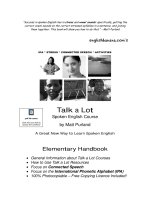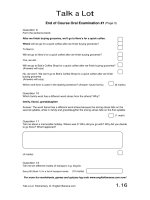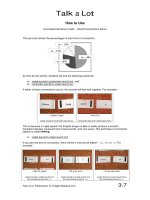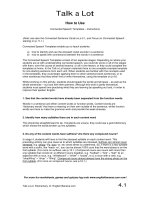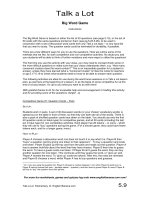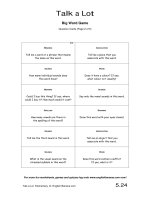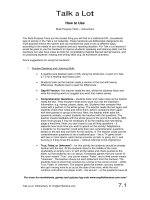Tài liệu Spoken english elementary handbook part 14 ppt
Bạn đang xem bản rút gọn của tài liệu. Xem và tải ngay bản đầy đủ của tài liệu tại đây (191.43 KB, 15 trang )
Talk a Lot
Focus on Connected Speech
Common Suffixes and What they Indicate
For more fun worksheets, games and quizzes log onto www.englishbanana.com now!
Talk a Lot Elementary © English Banana.com
15.1
• A suffix comes at the end of a word.
• Suffixes are usually unstressed.
• Adding a suffix changes the word type, e.g. a noun changes into a verb.
Below are some examples of how a root word can change type when a suffix is added:
Root Word
Word Type + Suffix Changes to Word Type
believe verb -able believable adjective
participate verb -ant participant noun (person)
walk verb (infin.) -ed walked verb (past participle)
interfere verb -ence interference noun
teach verb -er teacher noun (person)
big adjective -er bigger adjective (comparative)
China noun (country) -ese Chinese adjective (nationality)
clever adjective -est cleverest adjective (superlative)
faith noun -ful faithful adjective
Russia noun (country) -ian Russian noun (person)
access verb -ible accessible adjective
beauty noun -ify beautify verb
watch verb (infin.) -ing watching verb (present participle)
memory noun -ise memorise verb
child noun -ish childish adjective
science noun (abstract) -ist scientist noun (common)
attract verb -ive attractive adjective
name noun -less nameless adjective
quiet adjective -ly quietly adverb
arrange verb -ment arrangement noun
happy
adjective -ness happiness noun
cube noun -oid cuboid adjective
fame noun -ous famous adjective
cat noun (singular) -s cats noun (plural)
friend noun (common) -ship friendship noun (abstract)
revise verb -sion revision noun
maintenance noun -tain maintain verb
ten
number (cardinal)
-th tenth
number (ordinal)
revolve verb -tion revolution noun
Other common suffixes
-an
-ane
-ar
-ard
-cide
-cy
-ect
-en
-ert
-es
-ess
-et
-ey
-ia
-ic
-ical
-ies
-im
-in
-is
-ism
-it
-ity
-le
-logy
-o
-oir
-on
-or
-our
-ow
-phone
-ra
-raphy
-tain
-teen
-um
-ure
-us
-y
Talk a Lot
Focus on Connected Speech
Common Suffixes and What they Indicate – Matching Game
For more fun worksheets, games and quizzes log onto www.englishbanana.com now!
Talk a Lot Elementary © English Banana.com
15.2
Cut out the cards and ask your students to match each suffix with the type of word change that it makes. Students
could also give one or more example of words changing with each suffix, e.g. -able = verb to adjective (examples:
“believe” to “believable”, or “love” to “lovable”, and so on – see next page). You or your students could make more
cards, with different suffixes and word changes, using the Activity Cards blank template on p.12.29.
-able
VERB TO
ADJECTIVE
-tion
VERB TO NOUN
-ible
VERB TO
ADJECTIVE
-ese
NOUN TO
ADJECTIVE
-ive
VERB TO
ADJECTIVE
-ful
NOUN TO
ADJECTIVE
-ed
VERB (INFINITIVE)
TO VERB (PAST
PARTICIPLE)
-ish
NOUN TO
ADJECTIVE
-ant
VERB TO NOUN
-less
NOUN TO
ADJECTIVE
-ence
VERB TO NOUN
-oid
NOUN TO
ADJECTIVE
-er
VERB TO NOUN
-ous
NOUN TO
ADJECTIVE
-ment
VERB TO NOUN
-ify
NOUN TO VERB
-or
VERB TO NOUN
-ise
NOUN TO VERB
-sion
VERB TO NOUN
-ness
ADJECTIVE TO
NOUN
Talk a Lot
Focus on Connected Speech
Common Suffixes and What they Indicate – Matching Game
For more fun worksheets, games and quizzes log onto www.englishbanana.com now!
Talk a Lot Elementary © English Banana.com
15.3
More examples
1. verb to adjective
-able predict
Î
predictable allow
Î
allowable
-ible permit
Î
permissible digest
Î
digestible
-ive create
Î
creative extend
Î
extensive
2. verb (infinitive) to verb (past participle)
-ed walk
Î
walked listen
Î
listened
3. verb to noun
-ant consult
Î
consultant participate
Î
participant
-ence interfere
Î
interference exist
Î
existence
-er paint
Î
painter read
Î
reader
-ment enjoy
Î
enjoyment arrange
Î
arrangement
-or act
Î
actor conduct
Î
conductor
-sion admit
Î
admission decide
Î
decision
-tion alter
Î
alteration inform
Î
information
4. noun to adjective
-ese official
Î
officialese Portugal
Î
Portuguese
-ful grace
Î
graceful tear
Î
tearful
-ish child
Î
childish book
Î
bookish
-less hope
Î
hopeless end
Î
endless
-oid fact
Î
factoid rhombus
Î
rhomboid
-ous poison
Î
poisonous envy
Î
envious
5. noun to verb
-ify solid
Î
solidify identity
Î
identify
-ise liquid
Î
liquidise symbol
Î
symbolise
6. adjective to noun
-ness happy
Î
happiness tidy
Î
tidiness
Talk a Lot
Focus on Connected Speech
Suffixes and Word Stress
For more fun worksheets, games and quizzes log onto www.englishbanana.com now!
Talk a Lot Elementary © English Banana.com
15.4
• Suffixes are usually unstressed.
• Words with the following suffixes are usually* stressed on the syllable before the
suffix (shown in bold):
Suffix
Example #1 Example #2 Example #3 Example #4
-able unbeliev-able inconceiv-able unforgiv-able accept-able
-age advant-age discour-age percent-age remarri-age
-ance assist-ance annoy-ance reappear-ance import-ance
-ancy account-ancy expect-ancy redund-ancy discrep-ancy
-ed consult-ed inflict-ed present-ed unexpect-ed
-ency depend-ency absorb-ency complac-ency inconsist-ency
-ent independ-ent insuffici-ent correspond-ent incandesc-ent
-eous outrag-eous courag-eous simultan-eous advantag-eous
-ial colon-ial bicentenn-ial financ-ial artific-ial
-ian optic-ian amphib-ian mathematic-ian vegetar-ian
-ible incred-ible collect-ible incomprehens-ible undigest-ible
-ic encyclope
d-ic microscop-ic fantast-ic problemat-ic
-ical illog-ical econom-ical philanthrop-ical stereotyp-ical
-ify overident-ify demyst-ify electr-ify object-ify
-ious rebell-ious industr-ious unostentat-ious conscient-ious
-ity commun-ity believabil-ity incomprehensibil-ity respectabil-ity
-ment content-ment entertain-ment engage-ment underachieve-ment
-raphy geog-raphy biog-raphy callig-raphy photog-raphy
-sion apprehen-sion dimen-sion incomprehen-sion supervi-sion
-tion infla-tion interven-tion informa-tion contradic-tion
-ual unus-ual noncontract-ual intellect-ual multiling-ual
Exceptions to the rule
Words with the following suffixes are usually* stressed on the suffix (shown in bold):
Suffix
Example #1 Example #2 Example #3 Example #4
-ee trust-ee attend-ee interview-ee guarant-ee
-eer ballad-eer auction-eer volunt-eer engin-eer
-ese journal-ese Vietnam-ese Portugu-ese Canton-ese
-esque Chaplin-esque statu-esque pictur-esque Ruben-esque
-ess steward-ess lion-ess poet-ess manager-ess
-ette launder-ette usher-ette kitchen-ette maison-ette
-phobia claustro-phobia arachno-phobia techno-phobia xeno-phobia
-phobic claustro-phobic arachno-phobic techno-phobic xeno-phobic
* Note: there will be some exceptions, as with any rule in English!
Compound Nouns
Contents
300 Common Compound Nouns – Ordered by Same First Word 16.1
Compound Nouns – Activity Sheet (First Words) 16.2
Compound Nouns – Activity Sheet (First Words) – Answers 16.3
300 Common Compound Nouns – Ordered by Same Second Word
16.4
Compound Nouns – Activity Sheet (Second Words) 16.5
Compound Nouns – Activity Sheet (Second Words) – Answers 16.6
Talk a Lot
Focus on Connected Speech
300 Common Compound Nouns – Ordered by Same First Word
Word stress falls on the first syllable of each word. Notice common first words, e.g. “school-”, “sun-”, and “water-”.
For more fun worksheets, games and quizzes log onto www.englishbanana.com now!
Talk a Lot Elementary © English Banana.com
16.1
airforce
airmail
airport
anteater
anybody
backpack
baseball
basketball
bathroom
birthday
blackmail
bookshelf
boyfriend
breadbin
breadknife
bridesmaid
broadcast
butterfly
campsite
carpet
carseat
cavewoman
checkout
cheesecake
chequebook
childcare
childhood
chopsticks
cliffhanger
climbdown
cocktail
collarbone
countryside
cupboard
darkroom
dashboard
daybreak
daytime
deadline
doorbell
doorway
drainage
drainpipe
dustbin
dustman
dustpan
earrings
eggcup
eggshell
everybody
everyone
everything
eyelash
fingerprints
fireman
fireplace
flatmate
flatshare
flowerbed
footage
football
footprints
fortnight
friendship
gamekeeper
gateway
girlfriend
granddaughter
grandfather
grapefruit
graveyard
greengrocer
greenhouse
guidebook
guideline
gunpowder
hailstones
hairbrush
haircut
hairdresser
handbag
handbrake
handcuffs
headlights
headline
heartache
hedgehog
homecoming
homework
iceberg
jackpot
junkyard
keyboard
knighthood
knockout
lampshade
landmark
landmine
landowner
landscape
lifeboat
lifestyle
locksmith
lunchtime
marketplace
mealtime
milkman
milkshake
moonlight
motorbike
motorboat
motorway
mountainside
namedropper
namesake
necklace
network
newsagent
newspaper
newsreader
nickname
nightclub
nightdress
nightlife
nothing
oatmeal
offspring
outback
outbreak
outline
paintbox
paintbrush
pancake
paperback
paperwork
passport
pawnbroker
payday
peanut
penknife
pickpocket
pigeonhole
pinball
pineapple
playground
playroom
playtime
ponytail
popcorn
postwoman
printout
pushchair
quarterback
quicksand
racehorse
racetrack
railway
rainbow
raincoat
rainforest
rooftop
roundabout
runway
salesman
salesperson
saleswoman
sandbox
sandcastle
sandpaper
sandpit
scarecrow
schoolboy
schooldays
schoolgirl
schoolteacher
scrapbook
screenplay
screenwriter
scriptwriter
shopkeeper
shoplifter
shoplifting
shortbread
shorthand
showroom
shrinkage
sideshow
slapstick
snowball
snowdrift
snowfall
snowman
softball
somebody
someone
something
spaceship
speedboat
sportswoman
spreadsheet
springboard
staircase
stalemate
starfish
statesperson
stepdaughter
stepmother
stopover
stopwatch
storeroom
strawberry
stronghold
summerhouse
summertime
sunbathing
sunblock
sunglasses
sunlight
sunset
sunshine
suntan
supermarket
supermodel
superstore
sweatshirt
sweatshop
sweetcorn
sweetheart
switchboard
tabletop
taxpayer
teacup
teammate
teamwork
teapot
teardrop
teatime
textbook
thunderstorm
timetable
tomcat
toothache
toothbrush
toothpaste
toothpick
tracksuit
troublemaker
troubleshooter
turnout
typewriter
undertaker
underwear
uprising
upturn
videotape
viewfinder
viewpoint
volleyball
waistband
waistcoat
waistline
walkway
wallpaper
wardrobe
warehouse
warthog
washroom
wasteland
watchdog
waterfall
waterfront
watermelon
waterworks
wavelength
webcam
webmaster
website
wheelbarrow
wheelchair
wheelclamp
whiplash
whirlwind
whitewash
wildlife
willpower
windbreak
windmill
windowsill
windscreen
windshield
windsurfing
wonderland
woodland
woodpecker
woodworm
workbench
workman
workshop
wristwatch
yardstick
Note: anybody, everybody, everyone, everything, nothing, somebody, someone, and
something are, strictly speaking, pronouns rather than compound nouns, but we have
included them in this list as examples because they occur so frequently in spoken English,
and follow the same stress pattern as compound nouns – i.e. stress on the first syllable.
